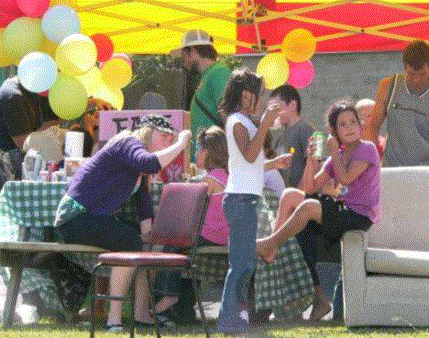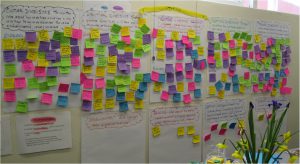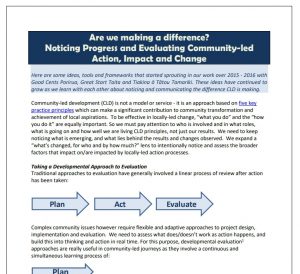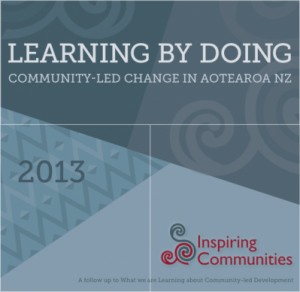Tips for organising a street BBQ
Getting together with your neighbours is one of the many things you might do to help build a sense of community in your street. You might start by inviting a couple of neighbours over for morning tea or a pot luck lunch. For residents keen on putting together something a little larger in scale, Massey Matters has produced this handy ‘how to’ guide to help make your job a little easier.
Looking back to move forward
Tangible CLD Learnings & Insight Report
These pages harvest the learnings from the four communities who worked with the Department of Internal Affairs as part of the Community-led development Pilot projects between 2011 and 2016. Over the course of the project, teams learnt what works, what doesn’t and how outcomes can vary. In this spirit of this, they offer reflections, stories and tools to support and help other community-led initiatives to thrive.
The following pages have been broken into digestible sections so you can download those pages of interest and relevance to you. If you would like to receive a full copy of this report, please contact us directly at exchange@inspiringcommunities.org.nz
CLD Planning and Evaluation Framework
Tightly defined, traditional planning approaches don’t easily suit the very emergent, adaptive work of CLD. Developing a Theory of Change framework will enable you to collectively work to identify your goals, review your progress and adapt your thinking and actions accordingly. It helps us all be more adaptive, nimble-footed and effective in the way we act.
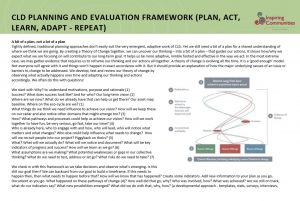
How to measure and monitor CLD
To be effective in locally-led change, what you do and how you do it are equally important. So we need to keep noticing what is emerging, and what lies behind the results and changes observed.
We need to pay attention to who is involved and in what roles, what is going on and how well we are living the CLD principles, not just our results.
We need to keep noticing what’s emerging, and what lies behind the results and changes observed. We need to intentionally notice and assess the broader factors that impact on and are impacted by locally-led action processes.
Facilitating Effective Teamwork and Learning
CLD needs good facilitation skills and teamwork. It’s essential to grow a high trust culture from the beginning; where learning from failure and success is the norm.
Community-led development needs good facilitation skills and teamwork. It’s essential to grow a high trust culture from the beginning; where learning from failure and success is the norm. We may come to the party with fears and disappointments from past failures, so it’s important to spend time on whakawhanaungatanga/getting to know each other; sharing our stories, hopes, fears, vulnerabilities and strengths; and achieving some small wins together. This all helps to create a foundation of trust and commitment. We can then build on that foundation to harvest learning from our doing.
Here are a few strategies for overcoming common challenges in growing a high trust culture. Click the image to access the resource.
Essential conditions for change
Are the essential conditions for change present in your community?
Here are some key success factors as well as some practical examples of these in action, to get you thinking about what would work in your community.
Child-Rich Communities Webinars
The overarching goal of the Child Rich Communities (CRC) project is to grow a movement of people who think and work in community-led ways to improve child, family and whānau well-being.
Our CRC 2018 webinars combined theory and experience, with community-based practitioners from diverse communities across Aotearoa sharing their experience. There was also space for questions and discussion on what’s making a difference for children and families.
David Hanna from Inspiring Communities facilitated each webinar and presented on the Child Rich Communities framework. Over the course of the webinar series, each of the guiding principles that make up the Child Rich Communities approach was covered.
Connect and Empower! The first webinar explored the principles of engagement, empowerment and connection. Julia Milne (Common Unity) and Steve McLuckie (Shore to Thrive) presented.
It’s all about relationships. The third webinar explored the principles of being relationship focused and the importance of collaboration. Lisa McKenzie (Hokonui Highway Project) and Erena Mikaere Most (Ruapehu Whānau Transformation Plan) presented.
The big picture. The second webinar explored the principles of thinking and working holistically and being responsive. Ginny Larsen (Mairehau Neighbourhood Trust) and Jane Denley and Adam Rivett (Waimate Parenting Hub) presented.
Communities of Practice
Our Communities of Practice aim to support those already working in community-led ways. Through peer learning, in groups of 6 – 8 people, we aim to strengthen everyone’s confidence, skills and knowledge and build ongoing local support networks. Currently, we have three communities of practice operating: one in Wellington, one in Christchurch and two online. If you’d like to know more, please contact us today.
Workshops
These workshops explored what a Child Rich Community (CRC) is, what the CRC practice principles are all about and how local people and organisations can work together to support the development of CRC thinking and practice locally.
Watch some of the Bright Spot communities
Check out locals leading change in their communities. Hear their stories and share their insights into the rewards and challenges of using community-led approaches to support children and families.
About community led development
You an also check out our Bright Spots webinar from 2017. In this webinar, we examined three lessons that emerged from the Bright Spots report. Lizzie McMillan from Wesley Action Waitangirua and Jenny Jurgens from Whanganui Central Baptist Kindergarten provided great case studies to demonstrate these learnings in practice.
Does this sound like something you’re interested in? Get in touch and join us. Or if all of this sounds like what you’re currently doing in your community, we’d love to tell your story. Contact Lisa Woods, lisa.woods@inspiringcommunities.org.nz, 021 1228 273.
Want to hear more about how people around the country are mobilising their community to improve child well-being? Read about the values and the history of the project here.
Learning by Doing – a handbook
In 2013, Inspiring Communities published a comprehensive examination of community-led development. Appropriately named Learning by Doing, it includes both theory and practice, and is essential to anyone working in CLD in New Zealand.
Learning by Doing (LBD) includes comprehensive thinking, learning, examples and results from community-led activity right across Aotearoa. It’s become a ‘must have’ handbook for people and organisations wanting to empower and support locally-led change. Noticing change is at the foundation of effective change. CLD is a long term game, and one where rules, models and evidence only take us so far. We are constantly reminded that not everything that counts can be easily measured. So it’s important that we embrace a ‘learning by doing’ approach in order to better understand what works, what doesn’t and why. Sharing diverse examples, stories, ideas and results from community-led activity around Aotearoa serves to strengthen a community’s ability to succeed. These examples are intended to support and inspire you to use community-led development to make positive change in your place.
A number of the book’s chapters are also available to download and share:
See highlights from the launch of Learning by Doing at Te Papa here.
What others have said about Learning by Doing….
“This book is a fantastic resource for practitioners and policy makers. It both provides a collection of really useful tools and resources, and it shares “real life” stories of how people have made use of these in practice in New Zealand. I highly recommend it.” Liz Weaver, Head Coach Tamarack Institute of Community Engagement – Canada
“Learning by Doing is a gift to the nation and also to the international community-led development movement. Just when we need it most, here is a book guiding people back to the power of community.” Jim Diers, Neighbourhoods Expert- Seattle USA.
Deepen your knowledge by purchasing a copy of Learning by Doing
To purchase a copy please email exchange@inspiringcommunities.org.nz
CLD Coordinator Job Description Template
This template will guide and support you when crafting a job description to recruit a CLD Coorindator / Support role for your community group, organisation or project.
Here we cover off values, likely responsibilities and key tasks, core relationships and an ‘About’ section for our own organisation.
Use this resource to tailor to your own needs, guiding your job description to suit your unique organisational / project needs.

